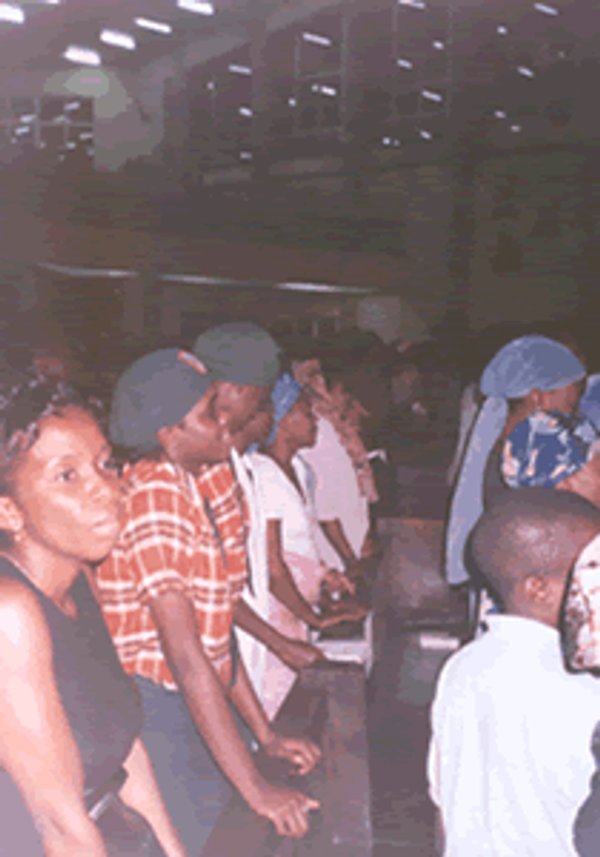The first feast day Mass of St. Josemaría Escrivá was celebrated at St. Dominic’s Catholic Church on Thursday June 26th 2003 before a crowd of about 2000 people, who began to arrive as early as 5.00 pm.
The Mass which began at 6.30 pm had as Chief celebrant, Msgr. Ignatius Sotos, Vicar of the Opus Dei Prelature in Nigeria, who was assisted by Msgr. Robert Lozano and Rev. Dr. Edward Emukpoeruo.
Several of them at the Mass were school students in their uniforms accompanied by their teachers. Being a working day, many people came straight from their places of work. The usual rainy weather took a good break as the weather was perfect, with no rain before nor after, quite unlike the entire week. St. Dominic’s is a church well suited for such an occasion being located in an area with relatively light traffic. The interior of the church itself is spacious enough to accommodate almost 4000 people, were that to be the case. The church is constructed in an almost circular shape, with ten rows of pews, in such a way that from any position, one has a perfect view of the altar, even having an upstairs gallery, with almost as much space as the ground floor.
The Masses of St. Josemaría have become a sort of yearly family reunion or many people, each of whom receives spiritual formation in Centres of Opus Dei. Opus Dei teaches that everyone man or woman, of whatever profession or job can find holiness through carrying out as perfectly as possible his or her ordinary task for love of God. This teaching has opened up for many Nigerians new horizons in the midst of their daily life, finding now undreamed-of possibilities of holiness. According to the teaching of St. Josemaría Escrivá, holiness is not the exclusive prerogative of priests and religious, but for everyone.

Msgr. Escrivá was declared a saint by Pope John Paul II at an impressive ceremony held in Rome last year on October 6. That event was witnessed first-hand by more than 800 Nigerians who travelled to Rome. There, they were part of a joyous crowd that was estimated to be about 300,000. That year (2002) also coincided with the Centennial of his birth on January 9, 2002. Several initiatives and projects have been undertaken to mark the Centennial, including here in Nigeria with a social project, which is the Institute for Industrial Technology (IIT), a technical school based at Ogba, Ikeja.
Under the inspiration of St. Josemaría, there are many other projects of an educational, social, medical nature all over Nigeria, set up by men and women who feel concern for their surroundings, and thus want to contribute to improving the world in which they live. There are Study Centres (Such as Wavecrest, Imoran, Helmbridge), Catering schools, Hospitals, Rural Development Centres , etc: initiatives responding to the new saint’s invitation to share our neighbours’ concerns.
Speaking during the feast day Mass, Msgr. Sotos said that now, St. Josemaría Escrivá does not belong to Opus Dei alone, being now a saint of the Universal Church. He recalled St. Josemaría’s constant teaching that all the pathways of the earth, and all noble human occupations (work, family, friendship, mundane things such as reading a newspaper), are paths to holiness. We all can become saints. We believe this with the confidence of children of God. Msgr. Sotos also prayed for the gifts of tenacity and perseverance, which everyone needs to make sanctity possible. Christians, he said (following St. Josemaría’s teaching) are like intravenous Injections in the blood stream of society, which they try to transform from within.

These teachings are having practical repercussions in Nigeria. At the Institute for Industrial Technology, students are being taught how to find God in the factory, and thus to seek to work perfectly in order to please God, and also to treat kindly all the persons they encounter in the course of their daily work. At the Lagos Business School, a project undertaken by some members of Opus Dei and their friends, Nigerian businessmen and women have been receiving formation in ethical business practice, empowering them to create “an oasis of sanity” despite the prevailing downturn in values in the society.
At the end of the feast day Mass, the Pastor of St. Dominic’s Parish where the Mass was celebrated, Fr. Mary Vincent thanked the Vicar for the choice of this church for the celebration of a historic event: the first Feast day Mass of St. Josemaría since his canonisation.
The Archbishop of Ibadan, Most Rev. Dr. Felix Alaba Job was the chief celebrant in a Mass celebrated at Our Lady Seat of Wisdom chapel of the University. Similarly, the Auxiliary Bishop of Warri was the chief celebrant at a Mass in the Cathedral organised by the co-operators and friends of Opus Dei since there are no Centres of Opus Dei in that city. I got news of Masses being celebrated also in Nsukka, Owerri, Abeokuta, Benin City and even at Iloti village on the road to Epe. The Co-adjutor Bishop of Onitsha archdiocese, the Most Rev. Dr. Valerian Okeke, was the chief celebrant at the Mass of St. Josemaría taking place in Onitsha on Wednesday July 2, 2003, also organised by co-operators and friends of Opus Dei.
Devotion to St. Josemaría Escrivá is widespread in Nigeria, with many going to his intercession for needs of all kinds, spiritual and material. There are also thousands of Nigerians who are struggling to find sanctity in the middle of the world, following the teachings of the new saint.
